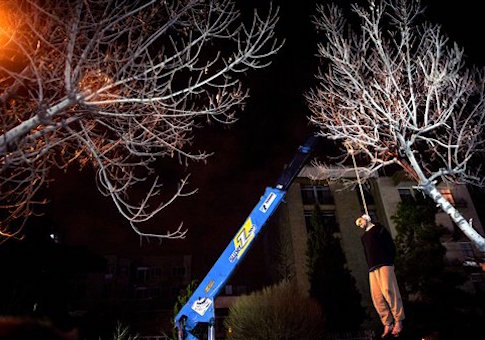A European machinery company that has received more than $1 billion in U.S. government contracts is coming under scrutiny after pictures emerged this week of its cranes being used to publicly execute individuals in Iran.
The company, Cargotec, acknowledged to the Washington Free Beacon on Wednesday that its equipment is being used to publicly hang Iranian prisoners, but maintained that it is not responsible for directly selling the equipment to the Islamic Republic.
However, advocacy groups critical of Iran’s human rights record say that companies such as Cargotec should be doing more to prevent equipment from reaching Iran, given their status as U.S. government contractors.
Cargotec, via a Texas-based subsidiary called Kalmar, has long partnered with the U.S. government to provide equipment mainly to the Pentagon. These contracts have totaled around $1.21 billion as of November 2015, according to records compiled by the Federal Procurement Data System.
Photographs of a Cargotec crane being used for an execution earlier this week were first published by Iranian-controlled websites and prompted criticism from groups such as United Against a Nuclear Iran, which has been waging a pressure campaign to stop companies from providing this type of equipment to Iran.
The Cargotec crane, built and sold by a subsidiary called Hiab, is clearly visible in the photographs, which show a hooded individual being raised on to a platform and then hanged from a rope tied to the crane. The execution reportedly took place in the Iranian city Khoy.
The U.S. government also has purchased Hiab cranes from Cargotec. The equipment is being used by the U.S. Army on a fleet of tactical vehicles, according to the company.
"We have seen numerous examples over the years of the Iranian regime using the cranes of brand-name companies to publicly execute people," said Matan Shamir, UANI’s executive director. "Cargotec should follow the lead of other responsible companies and end its Iran business given the exploitation of its products to commit such egregious abuses."
A spokesman for Cargotec said that the company is "sad" to see its products being used to help the Iranian regime execute its citizens.
"We are aware of the unfortunate situation where cranes have been used in public executions in Iran," the spokesman said via email. "We are naturally extremely sad to see these pictures and strongly judge this kind of action and behavior."
Cargotec maintains that it has not violated international sanctions barring the sale of certain items to Iran.
"Cargotec and Hiab are committed to full compliance with applicable national and international laws and regulations," the spokesman said. "We want to be a good corporate citizen in each jurisdiction we operate in. Cargotec has not sold anything to Iran against the E.U. or U.S. trade restrictions. Cargotec has a screening process for all trade to sanctioned countries. We always require our business and our dealers to follow the applicable legislations."
The company believes that the Hiab cranes may have been sold to Iran "second hand."
"We have produced over 500,000 loader cranes during the last 70 years," the spokesman said. "Many of our cranes are sold second hand in the aftermarket and it is unfortunately impossible to control the flow of used equipment around the world, meaning that a crane sold in one country may end up in another without us having control over this."
Cargotec has been active in Iran in the past through relationships with several companies, including an Iranian distributer named Lajvar, a crane company, according to information on its website. Lajvar cranes have been spotted in the past being used to hang individuals.
Criticism from groups such as United Against a Nuclear Iran has focused on companies such as Cargotec that also hold U.S. government contracts. These critics maintain that both the U.S. government and these companies should work harder to prevent Iranian human rights abuses.
"Given its lucrative business with the U.S. military, Cargotec should be even more sensitive to doing business with an avowed enemy of the United States that is responsible for killing hundreds of American soldiers," said Shamir.
Cargotec, for instance, via its Texas-based subsidiary, has won taxpayer funds to build rough-terrain forklift trucks for the Pentagon.
It also has worked with the U.S. Navy to construct a ship-to-ship vehicle transfer system, which is "designed to transfer military vehicles between ships at sea to support U.S. Army and Marine Corps land forces," according to a Cargotec press release.
